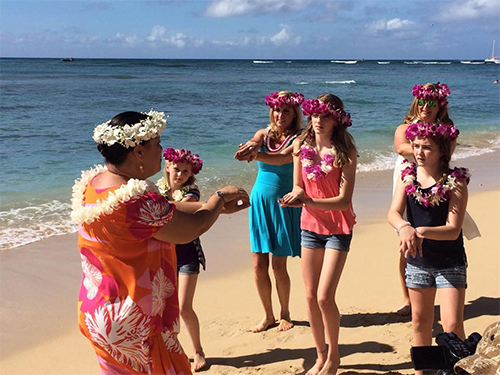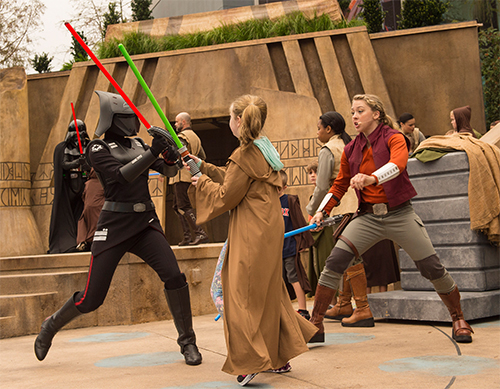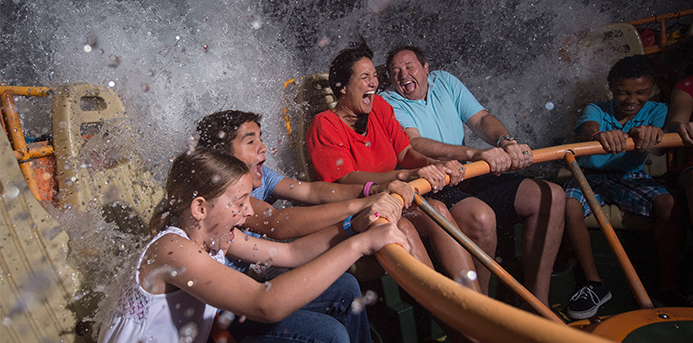Traveling as a family can be a wonderful experience that creates lifelong memories, but it can also be a bit trying — especially when your children are tweens and teens. To minimize the eye rolls and attitude and maximize the family fun, we asked some travel experts (who also happen to be parents of older kids) for their tips for traveling with teens and tweens.
While You’re Planning
1. Get Kids Involved in Planning at the Start
“The key to designing a great trip with a tween or a teen is to get them involved and let them have some say,” says Suzanne Rowan Kelleher, family vacations expert at About.com. “Where you go depends on the interest of the kids. If you have a kid who is into nature and wildlife, they’d love a wildlife experience. If you have kids who want to have fun all the time and are non-stop and like independence, a cruise can be a good choice.”
2. One-on-One Trips Can Be Fun
“I’m a big fan of not every family vacation has to be everyone in the family and that’s much easier to do when your kids get older,” says Kelleher. “A one-on-one trip can be a really great experience for both you and your kid, especially if it is doing something your teen really loves and you get to experience that with them.”
3. To Miss School or Not?
Taking your kids out of school for vacation is a hot-button issue. Doing so depends on a variety of factors, including your school district’s policies, how many days of school your child will miss, and how your child is doing in school. “It’s much easier to take them out of school when they’re younger; it gets harder as kids get older,” says Colleen Kelly, host of the show “Family Travel with Colleen Kelly” on public television.

If missing school is not an option, don’t despair. “When it’s high season in one place, it is usually low season somewhere else,” says LiLing Pang, founder and CEO of Trekaroo.com, a website devoted to family travel. She notes that spring breaks vary widely around the country, so destinations may not be as crowded as they are over the holidays, when the vast majority of kids are out of school.
4. Discuss the Budget
Giving kids some control over the trip can be a great way to teach them about budgeting. “When kids help decide what to do with a set amount of money, they quickly learn about trade-offs, which form the basic premise of budgeting,” says Kelleher. “Do they want to stay in a cool hotel instead of doing certain activities or eating at a particular restaurant?”
5. Show Them Where They’re Going
With maps losing popularity, kids don’t always know where everything is geographically located. “Show your kid where they’re going on the map,” suggests Kelly, who says while her daughter was very excited to go to Scotland, she wasn’t all that sure where it was.
Also show kids what to expect upon arrival. Pang says she often watches a few YouTube videos with her kids so that they get a feel for their destination and advises checking out documentaries on your destination at the local library.
Choosing a Destination
6. Consider the Great Outdoors
When selecting a destination, Kelly recommends places that involve lots of time spent outdoors being active. Her daughters loved skiing in Colorado, and she also likes Wyoming for tweens.
“Beach vacations are great, too, because they are fun for all ages. Teens and tweens love beaches because of all the activities,” says Kelly.

7. Don’t Rule Out Mickey and Harry and Friends in Orlando
If you want to stay together as a family, consider a place that offers something for all ages. Many destinations are working to appeal to older kids, including perennial favorite Walt Disney World. There is a lot beyond Dumbo and It’s a Small World. “Disney celebrates children of all ages and as kids get older, there’s a large variety of thrills and unique experiences for them in all four of our theme parks,” says Jessica Jackson, marketing strategy manager at Walt Disney World Resort, noting that two water parks and the shopping and entertainment options at Disney Springs are also popular with older kids. They even have a website devoted to planning trips with older kids.

“Teens love Disney World and for parents it is a perfect, albeit expensive, vacation choice. Parents can permit teens an extraordinary amount of freedom at Walt Disney World and teens will relish that freedom, plus it is an excellent learning experience,” says Liliane Opsomer, co-author of “The Unofficial Guide to Walt Disney World with Kids 2016.”
Disney isn’t the only option in Orlando. “Universal Studios and Islands of Adventure are favorites among teens as the parks offer much wilder rides and most are under the spell of Harry Potter no matter their age,” says Opsomer. Universal Orlando’s The Wizarding World of Harry Potter delights muggles of all ages, just like J.K. Rowling’s books.

8. Make History Come Alive
Even kids who don’t love history at school can become captivated when they see it with their own eyes on vacation, which happened for Pang’s tween son when they visited Boston and Salem. She said he was able to connect those periods in history to what is happening in the world today, which led to fascinating discussions. “Being thoughtful as a parent and bringing kids into the conversation can make traveling with kids this age amazing,” she says.
While You’re on Vacation
9. Set Limits on Technology
“A lot of families don’t get a lot of time together in their regular lives. Teens are especially busy, so the more that you can make these family trips be about reconnecting, the better,” says Kelleher. Reconnecting is hard, though, when kids stare at their phones for extended periods of time, and the experts all agree that parents should set limits on usages and they should do so well in advance of departure. The experts all recommend making mealtime technology-free.
Pang suggests explaining to kids why disconnecting is important. When her kids said they weren’t seeing anything new, she told them even places that look similar are often quite different on closer examination, encouraging them to find the uniqueness and to wonder about it, something they can’t do if they are only looking at their phones.
“Vacation is the kids’ downtime, too, so my kids are allowed to have their phone at the end of the day,” says Kelly. Pang adds, “We usually permit around an hour of time on their devices, but it is not guaranteed. We use it as a carrot to hold out for being good traveler.” Pang notes that a good attitude and being engaged help ensure some tech time.
10. Bring Extra Chargers and Batteries to Keep Technology Working When You Do Want Kids to Use It
Even if you’ve set strict phone limits, you want to be able to reach your kid, especially if you become separated unexpectedly, which is why Opsomer recommends bringing plenty of extra battery chargers. “Reiterate that you expect them to have enough juice to stay in touch with you when they are off on their own,” she says.
11. Take Advantage of Learning Opportunities
Seek out teachable moments when on the go. Kids can be in charge of finding the gate number and determining how to get from terminal to terminal at the airport. Even navigating to the room in the hotel or figuring out where to go next using the museum guide can be beneficial learning experiences for kids. Remember, they’ll be traveling on their own before you know it, and the time to learn how to do it is now.
Family travel is also an opportunity to learn the value of compromise. “By doing a bit of what interests everyone in the family, kids learn about the reciprocal arrangements often needed when dealing with others. For example, we will do my museum in the morning, and their activity in the afternoon,” says Kelleher.
12. Try New Things and Step Out of Your Comfort Zone
Try an activity that is new to both you and your kids. “The first time you do something new is a memorable event and it becomes a special vacation,” says Kelleher. She says that while returning to the same destination and doing the same things can be fun, the trips start to run together after a while. Kids are more likely to remember the specifics surrounding a new and different activity, even if it isn’t high on a parent’s wish list.

“There may be things that I wouldn’t necessarily choose to do or build my trip around, but I do it because of my kids,” says Pang. Opsomer agrees, saying that wild rides “are really not my thing” but she hopped on them with her son anyway.
13. Consider Letting Older Kids Sleep In
“It’s important to respect your kids’ opinions and what they want their vacation to look like,” says Kelleher.
“My son is 15, and he said that getting up at 7 a.m. every day is not a vacation to him. He wants to sleep in every morning. If sleep is a priority, there should be respect for that,” she says, explaining that she did plan around his late mornings and that she realized that giving her son that flexibility, and the fact that he was well-rested, “makes the whole day go better.”
14. Remember That It Doesn’t Have to Be Perfect
“Often the things that went wrong on your vacation become funny when you get home. Those mishaps become the inside stories that make you laugh later on, possibly for years to come,” says Kelly.

